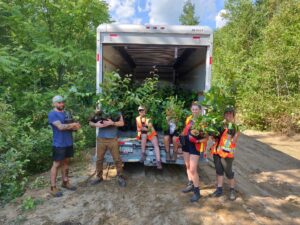Text from Press Release issued June 19, 2012.
Marysville – Five community-based organizations in the Nashwaak watershed have individually and collectively submitted a formal request to the Department of Environment and Local Government to classify the Nashwaak River and its tributaries.
On June 12th, the Nashwaak Watershed Association Inc, Taymouth Community Association, Stanley Agricultural Society, Stanley Area Action Group and the Penniac Anti-Shale Gas Group co-filed the official request to the New Brunswick Department of Environment and Local Government to classify the Nashwaak River and its tributaries. This request is a formal submission under Section 8.2 of Classification Regulation 2002-13 of the Clean Water Act 2002-56.
The community-based organizations joined forces to request official finalization of the classification program initiated in 2001 as a partnership with the Province and carried out by the Nashwaak Watershed Association. The watershed was given provisional classification status in 2002 that includes mostly pristine “A” class waters.
Paul McLaughlin, President of Nashwaak Watershed Association Inc. said both the organization and the taxpayers of New Brunswick have put substantial resources into the water classification process.
“For a number of years our programming focused on collecting and analyzing water quality data in order to establish these base conditions, McLaughlin said. “We operated under the premise that this work would lead to legal protection of our river”. “Since the documents were turned over almost ten years ago, no further steps have been taken on the part of the Province, no clear explanation has been offered as to why that is, and no time line has been presented that we might take comfort from. Frankly, we feel there is no other course left for us to take but to press the Province to finalize the classification.”, he continued.
Lawrence Wuest, a resident of Stanley and the collator of the request on behalf of the organizations, is disappointed in the lack of action on behalf of the government to get this classification implemented. He says the only option is to follow the process outlined in the regulation.
“The regulation remains on the books as the law”, he explained. “Through this submission, these organizations have acted to exercise their rights under the law to protect their rivers and streams from damage from destructive activities currently proposed for the watershed”, Wuest continued.
Shale gas exploration and potential development of the proposed Sisson open-pit mine for tungsten and molybdenum are the activities he refers to.
If it goes ahead, the Sisson mine will be one of the world’s largest open-pit tungsten and molybdenum mines. It is a 400M$ development that includes a 150 ha by 250 m deep open pit mine, a 650 ha tailings pond, and 6 km of impoundment dams rising 20m higher than the Mactaquac Dam. These activities are proposed for the pristine headwaters of the Nashwaak watershed that bears one of the remaining runs of the soon to be listed ‘endangered’ Outer Bay of Fundy Atlantic salmon.
McLaughlin expressed his concern for the Nashwaak River. “The federal Fisheries Act was recently gutted and there are uncertainties in terms of how the new Environmental Assessment process will impact the review of the proposed open pit mine. If there are impacts to the water, the water classification regulation is the only legal tool we would have to defend this water, the fish, and the culture that depends on them“, McLaughlin explained.
The 5 groups who have requested the classification are now awaiting a response from the Department of Environment and Local Government.
Documents Presented
French copy of this press release: Communique classification des eaux [.pdf]
Fact Sheet on Water Classification [.pdf]
NWAI Classification Activity to June 2012 [.pdf]
Final Report in Support of a Request for Final Classification [.pdf]
Media Contacts:
Paul McLaughlin, Nashwaak Watershed Association: 450.4943, 440.3625
Lawrence Wuest, Stanley resident and request author: 367.2280
Edith Dextraze, Stanley Area Action Group: 367.3068
Stephen Gilbert, Taymouth Community Association: 455-4648
Beverly VanBeek, Stanley Agricultural Society: 367.3151
Armand Paul, Penniac Anti-Shale Gas Organization: 461.6395, 459.3272

